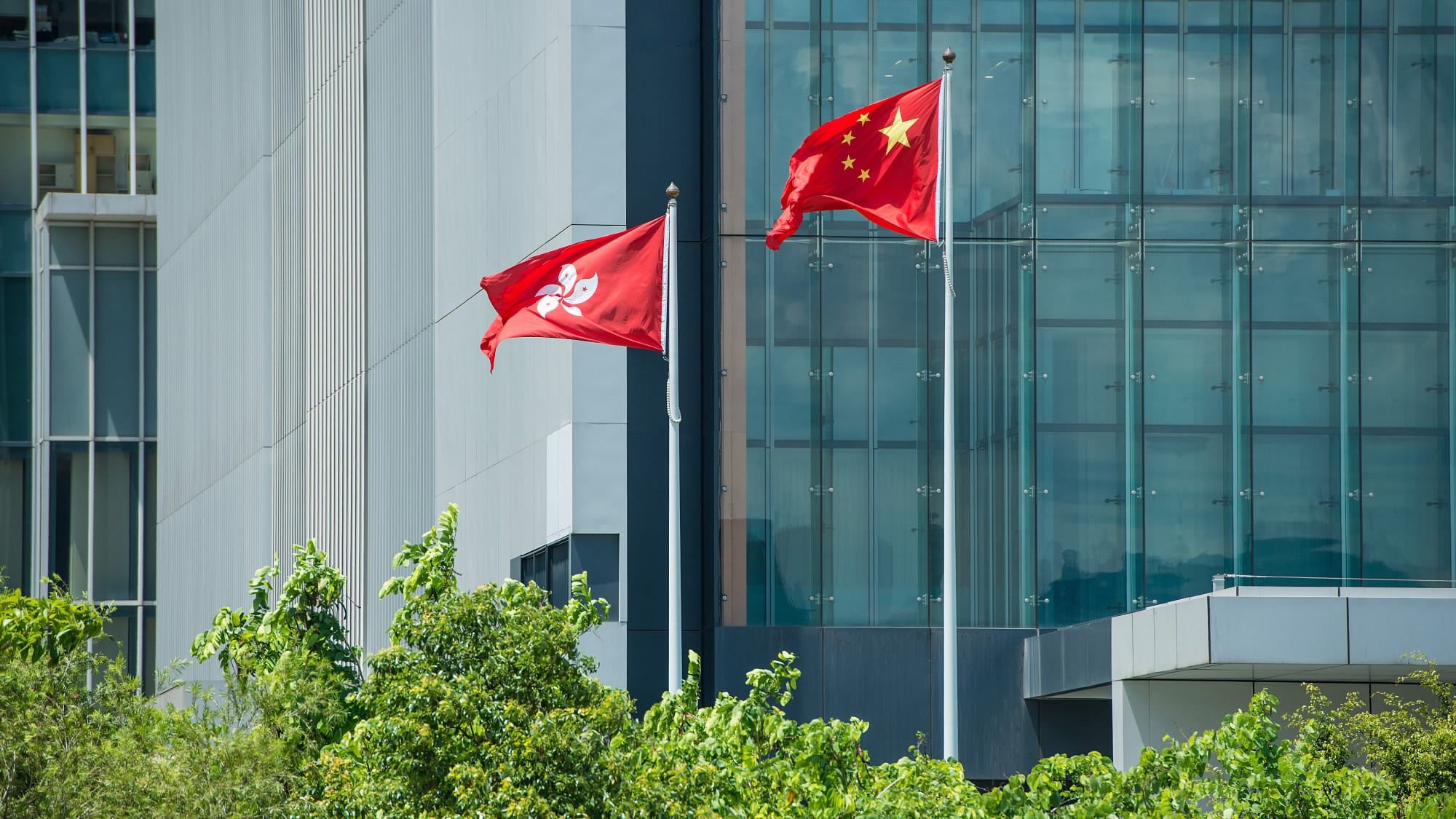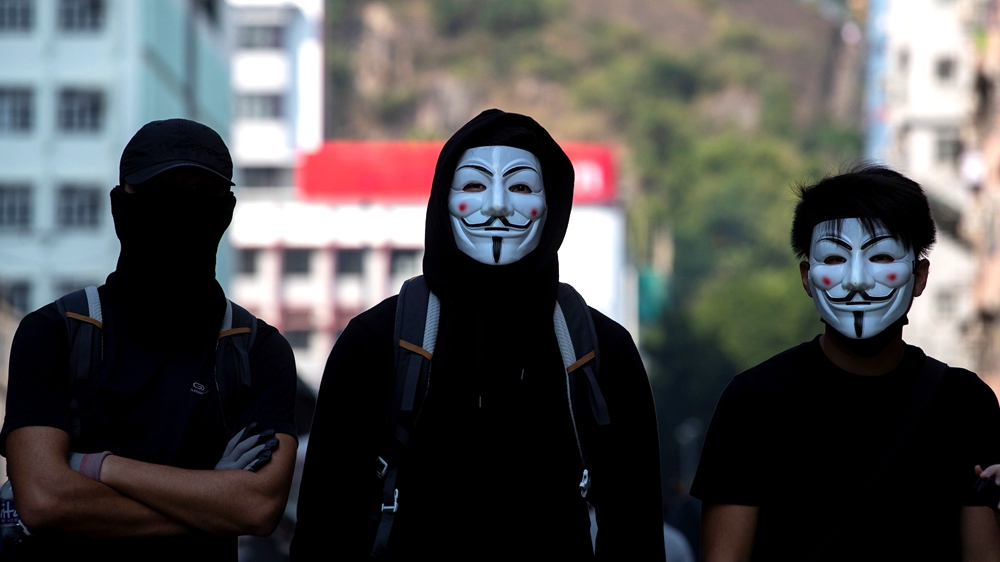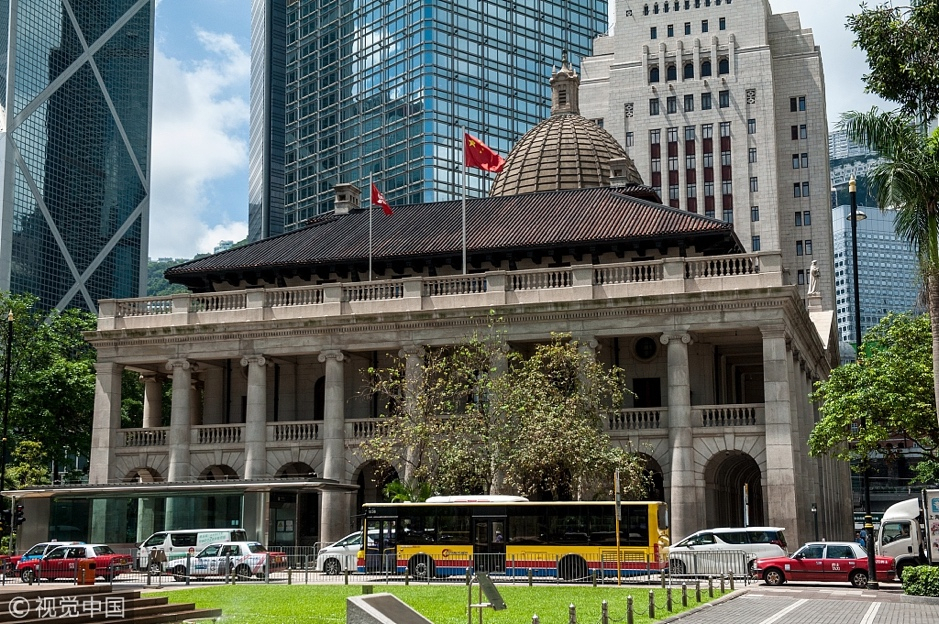
Editor's note: Tian Feilong is Associate Professor at the School of Law of Beijing University of Aeronautics and Astronautics, Director of the Chinese Association of Hong Kong & Macao Studies. The article reflects the author's opinion, and not necessarily the views of CGTN.
2020 marks the 23rd anniversary of the handover of Hong Kong from Britain to China. However, Hong Kong is still nowhere near passing the National Security Law as stipulated in Article 23 of the Hong Kong Basic Law.
This is a major loophole in practicing the "One Country, Two Systems" and a missing link in implementing the Hong Kong Basic Law earnestly and accurately. In HK's political discourse, Article 23 has been stigmatized since 2003 when a mass protest was staged to oppose the passing of it.
The opposition established the basic obligation under Article 23 as an infringement of Hong Kong's autonomy and freedom, but they fail to see the void it creates only to be filled with sustained attack to China's national sovereignty, security and development interests.
The lack of Article 23 legislation has led to huge loopholes in the national security aspect of Hong Kong's legal system, which has been exploited by radicals in Hong Kong and foreign interventionists. The protest against the amendment to Fugitive Offenders Ordinance in 2019 caused serious damage to the rule of law in Hong Kong and national security of China as a whole, and provided room of maneuvering for Hong Kong separatists who took the opportunity to grab more power. In face of this severe challenge, rising calls for Article 23 legislation have emerged from all walks of life in Hong Kong. Junius Ho garnered over one million signatories in favor of legislating Article 23 of the Basic Law, and then representatives of the HKSAR People's Congress and CPPCC members put forward legislative proposals in various forms.
These actions were met with enthusiasm by the public in Hong Kong. Beijing also attached great importance to this campaign and responded proactively. On the evening of May 21, 2020, Chinese officials confirmed that they would set in motion a bill on passing a national security law for Hong Kong during the "Two Sessions" this year and place them in Annex III of the Basic Law of the HKSAR.
This is a major event in the history of "One Country, Two Systems" and Hong Kong's Basic Law. It is also the embodiment of the central government's role as the sole legislator and ultimate guardian of the "One Country, Two Systems" policy framework as it takes up the slack for improving the constitutional order in HKSAR. Beijing stepped in to assume the main responsibility of legislating the national security law, mainly based on the following considerations: Firstly, the local legislation procedures for Article 23 in HKSAR were set back in 2003 and faced obstacles in restarting.
It is difficult for the local legislative body to fulfill the constitutional mission on its own. Secondly, the anti-amendment movement has exposed serious consequences of Hong Kong's local extremists and foreign interventionists colluding to undermine Hong Kong's autonomy.
Hong Kong's existing laws are inadequate to address these new challenges. Hong Kong's legal system must close the loopholes in the aspect of national security as soon as possible. Thirdly, the Fourth Plenary Session of the 19th CPC Central Committee put forward a draft decision on establishing and improving the legal system and enforcement mechanisms for the Hong Kong Special Administrative Region (HKSAR) to safeguard national security.

Protesters wear Guy Fawkes masks and a full face mask during a protest in Hong Kong, China, October 1, 2019. /Reuters
Protesters wear Guy Fawkes masks and a full face mask during a protest in Hong Kong, China, October 1, 2019. /Reuters
In China's drive to build a modern governance system, it is absolutely necessary for the NPC to exercise the functions and powers entrusted to it by the Constitution, to establish and improve the legal system and enforcement mechanism, in a bid to plug the loopholes in the HKSAR's legal system. Fourthly, the legislation by Beijing does not exempt the HKSAR government from its duty to legislate Article 23 under the Basic Law.
On the contrary, it provides a legislative template for the latter, and it is also a way of supervising and urging HKSAR to move in the direction of better rule of law. Fifth, the direct legislation by Beijing adds more substance to Beijing's full jurisdiction over the HKSAR under the framework of "One Country, Two Systems."
It's beneficial to balancing Beijing's governing authority and Hong Kong's access to a high degree of autonomy. It can also help to facilitate closer cooperation between Beijing and HKSAR in forming legal alignment and building enforcement mechanisms pertaining to national security.
The direct legislation by Beijing is actually one of many legislative approaches that can be adopted when the legislation of Article 23 is stalled in Hong Kong. Other possibilities include (1) the activation of Article 23 by the NPC Standing Committee by providing NPC's interpretation of the article, (2) the central government instructing the HKSAR government to complete the legislation of Article 23 before a deadline, (3) or directly including the 2015 National Security Law into Annex III of the Hong Kong Basic Law for enforcement.
After their pros and cons are weighed, the making a new national security law for Hong Kong directly by Beijing stands out as the most compelling and reasonable policy choice, as it can on one hand attend to the compatibility with the local laws and enforcement procedures in Hong Kong, and on the other hand showcase the institutionalized vision and intentions of the central government on national security.
The National Security Law of 2015 put forward the "comprehensive concept of national security," which expands the meaning and definition of national security to keep up with the changing times, thus differentiating itself from the national security issues specified in Article 23.
This time, Beijing circumvented specific issues defined in Article 23 and legislated a new security law to bring the HKSAR legal system up to China's national security standards. Such decision reflects the maturity and progress Beijing has achieved in understanding legal principles and technical operations pertaining to the national security legislation. The direct legislation by Beijing has sufficient constitutional legitimacy, and will play a positive role in improving Hong Kong's legal system under the framework of "One Country, Two Systems." The reasons are as follow.
Firstly, the NPC is the highest state authority in the Constitution. Its decisions have the highest legitimacy and enjoy the same ranking as the Hong Kong Basic Law in China's legislative hierarchy. The continued contribution to the HKSAR's legal system by the NPC in accordance with the Constitution has played a role in shaping and expanding the content of the Basic Law.

The Court of Final Appeal of the Hong Kong Special Administrative Region, China, September 19, 2018. /VCG
The Court of Final Appeal of the Hong Kong Special Administrative Region, China, September 19, 2018. /VCG
Secondly, the authoritative decisions by the NPC have provided guidelines and basis for enacting specific laws and building enforcement mechanisms by other national bodies and the HKSAR legislature.
Thirdly, the decision by NPC shows that the Constitution and the Basic Law together constitute the constitutional foundation of the Hong Kong Special Administrative Region, and governing Hong Kong in accordance with the Constitution has become an important part of the rule of law in Hong Kong.
The Constitution and its relevant organs and procedures shall be embedded as an intrinsic part of the constitutional order of the HKSAR and as the key references for Hong Kong's legislative activities.
Fourthly, the direct legislative decision made by Beijing can overcome Hong Kong's current lack of capabilities for self-governance. Constitutional authority and specific institutional measures provided by Beijing can support the HKSAR government to govern the city on the basis of rule of law and to counter the destructive intentions of local extremists and foreign interventionists to subvert the constitutional order of the Hong Kong, hence eradicating the risk of "color revolution" in Hong Kong.
In a nutshell, Beijing has always been the ultimate guardian of "One Country, Two Systems" and the Hong Kong Basic Law. It has a constitutional responsibility to make its own proper contribution to the rule of law under the framework of "One Country, Two Systems."
Regarding the national security legislation, the central government's seemingly "belated" but rather "firm" step is no replacement for the legislation of Article 23 by Hong Kong on its own.
Instead, it breaks down the hurdles standing in the way of its legislation, and provides impetus and support to the HKSAR government and local society to complete local legislation and improve local law enforcement mechanisms, thereby building a more robust and enforceable national security legal system and providing an institutional protection network for Hong Kong's prosperity, stability and a high degree of autonomy.
(If you want to contribute and have specific expertise, please contact us at opinions@cgtn.com.)